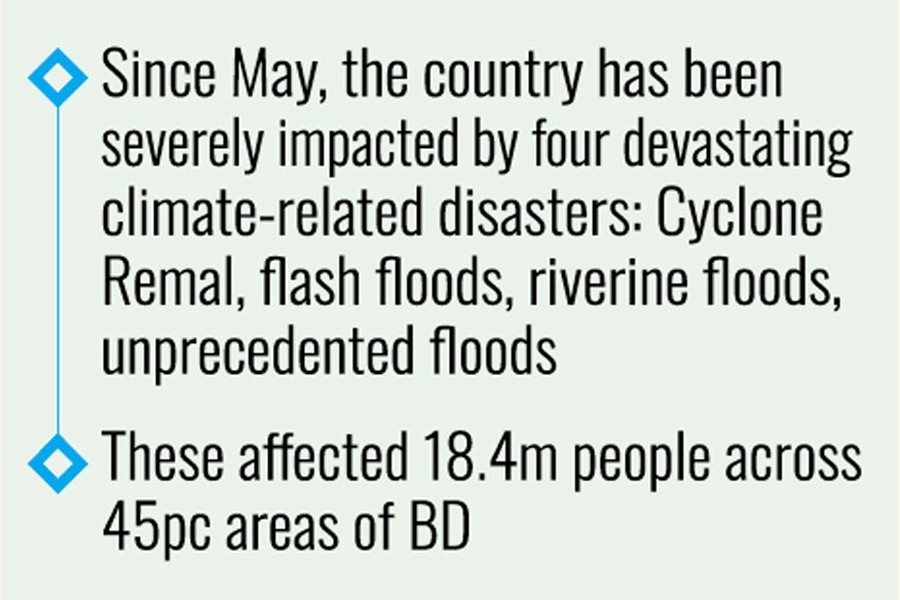
Published :
Updated :

The UN and partners have launched a humanitarian appeal for US$134 million to provide urgent relief and support to the communities affected by the ongoing cyclones and monsoonal floods in Bangladesh.
Since May 2024, the country has been severely impacted by four unprecedented and devastating climate-related disasters, including the Cyclone Remal, flash floods in the Haor region, riverine floods in the Jamuna basin, and unprecedented floods in the eastern regions. The situation is dire and requires immediate attention, said the UN on Sunday.
These events have had a catastrophic impact, affecting around 18.4 million people across 45 per cent areas of Bangladesh and causing significant damage to livelihoods and infrastructure.
This Multi-Hazard Humanitarian Response Plan (HRP) results from a consultative process, led by the government to respond to the most urgent needs through March 2025.
A humanitarian appeal was first launched in June 2024 for the Cyclone Remal, and this is the third version of the plan, extended to cover all four emergencies.
The HRP aims to reach 2.5 million people across 28 districts of Bangladesh. It has reached 1.8 million people with assistance despite receiving only 28 per cent of the funding.
The revised plan is a crucial partnership tool for the government, UN and non-governmental partners to continue coordinating the response. It also offers a common platform to raise the much-needed additional funding.
The plan was launched by the Humanitarian Coordination Task Team (HCTT) co-chairs, UN Resident Coordinator in Bangladesh Gwyn Lewis, and Ministry of Disaster Management and Relief Secretary Md Kamrul Hasan.
"This is an unprecedented humanitarian crisis in Bangladesh, with multiple disasters unfolding consecutively over several months," said Ms Lewis.
"The government and humanitarian community are working tirelessly to provide relief and support to the affected communities. We urge our development partners to contribute funds directly to the participating organisations involved in the HRP and to continue to invest in disaster risk reduction and climate change adaptation to build long-term resilience," she added.
"We must sustain our collaborative efforts through the government, UN, and multilateral and NGO partners," said Mr Hasan.
"The scale and frequency of disasters affecting Bangladesh is intensifying, and we must be prepared to adapt and support collective solutions to the climate crisis. We are proud of our record as a pioneer in anticipatory action. This is one of the tools we must continue to strengthen and work to 'build back better' following these disasters," he added.
The revised HRP addresses the most urgent needs of the affected population, including child protection and education, displacement management, food and nutrition services to maintain dietary needs, primary healthcare services, and water supply and latrine reconstruction.
It prioritises the protection of vulnerable groups, such as women, children, transgender individuals, people with disabilities, and older adults. Contributions will also help to protect livelihoods and build resilience in the affected communities.
Bangladesh expects its second cyclone season in October. As the communities potentially face more extreme weather before the end of the year, current needs must be addressed to mitigate vulnerabilities.
nsrafsanju@gmail.com


 For all latest news, follow The Financial Express Google News channel.
For all latest news, follow The Financial Express Google News channel.